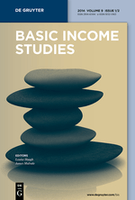
Basic Income Studies
Scope & Guideline
Transforming Welfare Discourse for Tomorrow
Introduction
Aims and Scopes
- Universal Basic Income (UBI) Research:
The journal investigates various aspects of UBI, including its feasibility, impacts, and societal implications, providing a platform for empirical studies and theoretical discussions. - Policy Evaluation and Experiments:
It emphasizes the evaluation of UBI pilot programs and experiments, analyzing outcomes, methodologies, and the lessons learned from diverse implementations across different contexts. - Socioeconomic Analysis:
The journal explores the socioeconomic effects of UBI, including its relationship with poverty alleviation, employment, and entrepreneurship, as well as its potential to promote social equity. - Political and Cultural Dimensions:
Research includes the political discourse surrounding UBI, examining public attitudes, social movements, and cultural narratives that shape the acceptance and implementation of UBI initiatives. - Interdisciplinary Approaches:
The journal promotes interdisciplinary research, integrating insights from economics, sociology, political science, and environmental studies to provide a comprehensive understanding of UBI.
Trending and Emerging
- Ecological and Sustainable Basic Income:
Recent publications have increasingly explored the intersection of UBI with ecological sustainability, examining how basic income can support environmental initiatives and address climate change. - Public Sentiment and Attitudes Towards UBI:
There is a growing focus on public perceptions and attitudes toward UBI, utilizing data from social media and surveys to gauge acceptance and the factors influencing public opinion. - Impact on Marginalized Groups:
Research on UBI's effects on vulnerable populations, such as women and indigenous communities, is gaining attention, highlighting the potential of UBI to address systemic inequalities. - Macroeconomic Implications of UBI:
Studies examining the macroeconomic aspects of UBI, including funding mechanisms and economic outcomes, are becoming more prevalent, reflecting an interest in the broader economic context of UBI. - Technological Unemployment and UBI:
The relationship between automation, technological unemployment, and the necessity of UBI is increasingly explored, as discussions on the future of work and economic security intensify.
Declining or Waning
- Historical Perspectives on Basic Income:
Discussions centered on the historical evolution of basic income concepts have decreased, possibly as researchers shift towards more contemporary evaluations and practical implementations. - Conditional Cash Transfers:
Research contrasting UBI with conditional cash transfer programs has waned, suggesting a potential consensus on the merits of unconditional approaches as UBI gains traction in policy discussions. - Theoretical Justifications for UBI:
While foundational theories remain important, the volume of research focused solely on justifying UBI from philosophical or ethical standpoints appears to be reducing, as empirical studies take precedence. - Comparative Analyses with Traditional Welfare Systems:
The comparative discussions between UBI and existing welfare systems are less frequent, indicating a possible shift towards more focused studies on UBI’s unique contributions rather than comparisons. - Longitudinal Studies on UBI Effects:
The frequency of longitudinal studies assessing the long-term impacts of UBI has decreased, which may limit understanding of its sustained effects over time.
Similar Journals
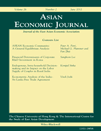
Asian Economic Journal
Advancing Knowledge on Development StrategiesAsian Economic Journal, published by WILEY, represents a crucial platform for scholars and practitioners in the fields of economics, development, and geography. Since its inception in 1987, this journal has evolved to encompass a wide array of research that addresses pressing economic challenges and innovative methodologies relevant to the Asian context and beyond. With an active publication timeline extending to 2024, the journal is indexed under various quartiles classifications, notably achieving a Q3 status in prominent categories such as Development and Economics. Researchers can access its rich repository of articles to deepen their understanding of economic dynamics, regional planning, and development strategies. Although the journal is not open access, its contributions are indispensable for those seeking to enrich the discourse on economic policies and development trends in Asia, making it an essential read for professionals, researchers, and students alike.
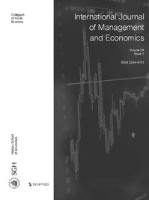
International Journal of Management and Economics
Exploring Innovative Solutions for Today's Economic ChallengesInternational Journal of Management and Economics is a distinguished open-access journal published by SCIENDO, dedicated to advancing research in the fields of management and economics. With its ISSN 2299-9701 and E-ISSN 2543-5361, this journal has been a notable platform for scholarly articles since its inception in 2013, aiming to facilitate the dissemination of high-quality research globally. Situated in Warsaw, Poland, the journal seeks to connect researchers, professionals, and students who are eager to explore innovative economic theories, managerial practices, and the implications of various economic policies. With a commitment to open access, the journal not only promotes wide accessibility to its published works but also enhances the visibility and impact of the research it showcases. Contributing authors have the opportunity to engage with a diverse readership while promoting discussions that are pivotal in today’s rapidly evolving economic landscape. As an emerging platform in its field, the International Journal of Management and Economics is becoming a vital resource for anyone interested in the intersection of economic principles and management strategies.
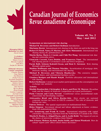
CANADIAN JOURNAL OF ECONOMICS-REVUE CANADIENNE D ECONOMIQUE
Your Gateway to Premier Economic ScholarshipThe Canadian Journal of Economics - Revue Canadienne d'Économique is a prestigious academic journal published by Wiley, dedicated to advancing research in the field of economics and econometrics. With its ISSN 0008-4085 and E-ISSN 1540-5982, this journal has been a vital resource since its inception in 1977, offering a platform for the dissemination of high-quality research and scholarly articles. As a distinguished Q2 journal in the 2023 Economics and Econometrics category, it ranks #405 out of 716 within the Scopus database, showcasing its influence and relevance in the academic community. Although it does not feature an open-access model, the journal remains committed to providing rigorous analysis and critical insights that resonate with researchers, professionals, and students alike. Its scope encompasses a wide range of economic disciplines, making it an essential publication for those seeking to stay at the forefront of economic thought and practice.

Social Justice Research
Exploring Multidisciplinary Perspectives on Social JusticeSocial Justice Research, published by SPRINGER, is a premier academic journal dedicated to the exploration of social justice issues spanning multiple disciplines, including anthropology, law, sociology, and political science. Established in 1987, the journal plays a crucial role in advancing scholarly dialogue and understanding of social justice themes, addressing contemporary challenges and theoretical frameworks. With an exceptional Q1 ranking in major categories and impressive Scopus rankings—#115 in Law and #64 in Anthropology—this journal underscores its significance in contributing to a deeper understanding of equity and justice in society. Although it operates on a traditional access model, it serves as an essential resource for researchers and professionals seeking rigorous analyses and innovative perspectives in these critical fields. As the journal continues through its converged years into 2024, it remains committed to fostering an environment that reflects diversity, inclusivity, and impactful scholarship, making it a vital platform for both seasoned academics and emerging scholars motivated to address pressing social issues.
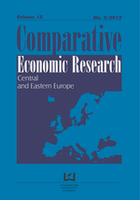
Comparative Economic Research-Central and Eastern Europe
Advancing Knowledge through Comparative Economic InsightsComparative Economic Research-Central and Eastern Europe is a distinguished open-access journal published by LODZ UNIV PRESS, dedicated to advancing the field of economics with a focus on comparative studies relevant to Central and Eastern Europe. Since its inception in 2009, the journal has provided a vital platform for disseminating research that explores the unique economic challenges and opportunities faced by this region. With an H-index indicating its contributions to the academic discourse, the journal maintains a Q3 ranking in Economics, Econometrics, and Finance, reflecting the quality and relevance of its published works. This journal is instrumental for researchers, professionals, and students seeking to engage with contemporary economic issues and methodologies, fostering scholarly exchange and innovation. Access to its rich repository of articles is provided freely to promote wider dissemination of knowledge, enabling impactful discussions and policy formulations in the dynamically evolving landscape of the Central and Eastern European economy.

American Economic Journal-Economic Policy
Shaping the Future of Economic GovernanceAmerican Economic Journal - Economic Policy, published by the American Economic Association, stands at the forefront of economic research, focusing on significant policy implications and evidence-based evaluations. With an ISSN of 1945-7731 and an E-ISSN of 1945-774X, this esteemed journal has maintained its influence and credibility in the field since its inception in 2009. Ranked in the Q1 category for Economics, Econometrics and Finance and ranking #7 out of 288 in Scopus, it boasts a remarkable 97th percentile ranking, making it a premier source for cutting-edge research and policy discussion. The journal's rigorous peer-reviewed articles aim to bridge the gap between academic research and real-world economic policy, serving as an essential resource for researchers, professionals, and students who seek to engage with and contribute to the evolving landscape of economic policy. With open access options not currently available, readers are encouraged to subscribe or access articles through academic institutions for comprehensive insights into the economic challenges and innovations shaping our world.
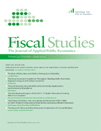
FISCAL STUDIES
Exploring the forefront of financial research.FISCAL STUDIES, published by WILEY, is a prestigious journal focused on the intricate dynamics of finance, economics, and accounting. With a history of excellence dating back to 1979, this journal has established itself as a leading publication, boasting an impressive impact factor and ranking in the top quartile across multiple categories: Q1 in Accounting, Q1 in Economics and Econometrics, and Q1 in Finance for 2023. As evidenced by its Scopus rankings—3rd in Accounting, 9th in Finance, and 23rd in Economics—this journal is an invaluable resource for researchers, professionals, and students pursuing in-depth knowledge in these fields. While it currently does not offer open access options, its comprehensive editorial scope ensures rigorous peer-reviewed articles that contribute significantly to fiscal discourse and policy development. Engage with FISCAL STUDIES to explore groundbreaking research and advancements in understanding financial systems and economic strategies.

Nigerian Journal of Basic and Clinical Sciences
Advancing health discourse in Nigeria and beyond.Nigerian Journal of Basic and Clinical Sciences, published by Wolters Kluwer Medknow Publications, serves as a vital platform for disseminating research in the fields of health policy, medicine, and public health, specifically addressing the unique challenges and advancements within these areas in Nigeria and beyond. With an impressive array of contributions, this journal, recognized under the ISSN 0331-8540 and E-ISSN 2320-477X, aims to foster scholarly communication and offer innovative insights particularly pertinent to developing regions. Despite being positioned in the Q4 category for various medical fields in 2023 and receiving low Scopus ranks, the journal stands out as a valuable resource for aspiring researchers, healthcare professionals, and students aiming to explore basic and clinical sciences. While it follows a traditional publication model, it remains an indispensable source for cutting-edge research and case studies that can significantly impact health outcomes. The journal has been consistently publishing since its inception in 2012 and continues to play an important role in advancing the academic discourse within its scope.
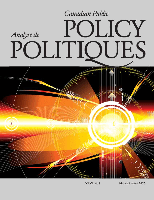
CANADIAN PUBLIC POLICY-ANALYSE DE POLITIQUES
Fostering informed practices in public administration.Canadian Public Policy - Analyse de politiques is a prominent academic journal published by University of Toronto Press Inc, dedicated to advancing the field of public policy through rigorous analysis and scholarly discourse. Since its inception in 1978, the journal has established itself as a vital resource for researchers and professionals alike, providing insights into the dynamics of public administration and sociopolitical issues in Canada and beyond. With an impressive impact factor and ranked in the Q1 quartile in both Public Administration and Sociology and Political Science categories, it is recognized for its exceptional quality and contribution to social science scholarship. The journal is indexed in Scopus, where it ranks in the top percentile for both its categories, showcasing its relevance and influence in contemporary policymaking discussions. Although it does not currently offer open access, it remains an essential tool for scholars seeking to engage with timely research and analyses that inform public policy decisions. The journal serves as a forum where academic rigor meets practical application, ensuring that new ideas foster informed practices within the realm of public policy.

Malaysian Journal of Economic Studies
Exploring the Depths of Economic KnowledgeMalaysian Journal of Economic Studies is a prominent peer-reviewed academic journal dedicated to advancing the field of economics, econometrics, and finance. Published by PERSATUAN EKONOMI MALAYSIA, this journal has been a vital platform for scholarly research since its inception, with a publication history spanning from 2007 to 2024. With an impressive Q3 quartile rank in the Economics, Econometrics, and Finance category and a Scopus ranking that places it in the 44th percentile among its peers, the journal serves as a critical conduit for disseminating innovative economic research and findings that can inform policy-making and academic discourse. Although it currently does not offer Open Access, it remains committed to enhancing the visibility of economic research in Malaysia and beyond. Scholars, practitioners, and students alike will find this journal a valuable resource that not only reflects the evolving economic landscape but also contributes to a deeper understanding of economic phenomena on a global scale.